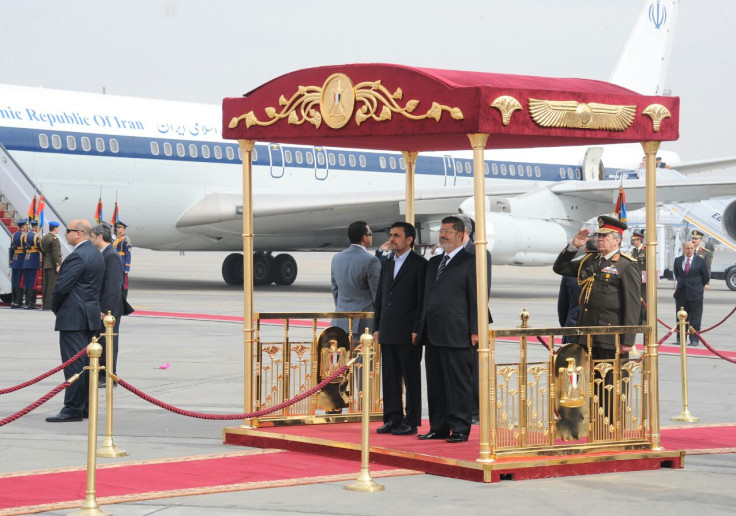Iran's Ahmadinejad Visits Egypt, But Don't Expect Hugs And Kisses Anytime Soon

It’s no secret that Iranian President Mahmoud Ahmadinejad is no longer the most popular kid in the Middle East cafeteria. The big-kid Imams who control who can sit where have been edging him more toward the end of the table. So on Tuesday, Ahmadinejad decided to attempt to boost his lunch room popularity and credibility by eating with the new "cool kids" in the room: the Egyptians.
Ahmadinejad arrived in Cairo on Tuesday, Iran’s official state IRNA news agency said. This is the first visit of an Iranian president to Egypt since 1979.
Ahmadinejad is there to attend a summit of the Organization of Islamic Cooperation, the 44-year-old, 57-member state coalition that is “the collective voice of the Muslim world,” and aims to “safeguard and protect the interests of the Muslim world in the spirit of promoting international peace.” The summit is scheduled for Feb. 6 and 7, and Ahmadinejad is also expected to meet with Egyptian officials during his stay, Al-Jazeera said.
Ahmadinejad also expressed a desire to visit the Gaza Strip, telling an interviewer in Beirut that he would go “if they allow it,” without specifying who “they” referred to, and saying that “the political geography of the region will change if Iran and Egypt take a unified position on the Palestinian question.”
In August 2012, then-newly elected Egyptian President Mohammed Morsi visited Tehran for a summit of the Non-Aligned Movement, the first time since 1979 that any Egyptian leader had set foot in Iran. Morsi’s election was praised in Iran as an “Islamic awakening” due to Morsi’s leadership in the Islamist Muslim Brotherhood party.
But Iran’s endorsement of the Brotherhood’s victory was met with skepticism both in Egypt and in the Gulf states, who do not have an easy relationship with the Islamic Republic.
In November last year, several Gulf States complained to the United Nations about Iran literally overstepping their boundaries and drilling for oil in other countries’ designated areas in the Gulf waters. Tehran and Cairo cut ties in 1980, just after the Islamic Revolution and after Egypt and Israel signed a peace agreement.
After 34 years of mistrust between the two countries, Ahmadinejad has now expressed fervent hopes that Egypt will accept him (and, by proxy, his country) back at their lunch table.
“I will try to pave the ground for developing co-operation between Iran and Egypt,” he said to reporters ahead of the trip, and told IRNA, “If Tehran and Cairo see more eye to eye on regional and international issues, many [issues] will change.”
Egypt doesn’t seem so sure. Morsi visited Tehran because, at the time, Egypt was the head of the Non-Aligned Movement; this was not a trip of brotherly love for Iran.
"The restoration of full relations with Iran in this period is difficult, despite the warmth in ties ... because of many problems including the Syrian crisis and Cairo's links with the Gulf states, Israel and the United States," said one former Egyptian diplomat to Reuters on Tuesday.
Egyptian Foreign Minister Ali Akbar Salehi said that he was “very hopeful about the expansion of the bilateral relationship,” but that everyone has to be “a little bit patient.”
Iran is expected to resume talks with various world powers on Feb. 25 and 26 in Kazakhstan on its controversial nuclear program.
UPDATE: Ahmadinejad has reportedly had the delightful experience of being hit in the face by a shoe. Unsatisfactory video confirmation below.
© Copyright IBTimes 2025. All rights reserved.






















